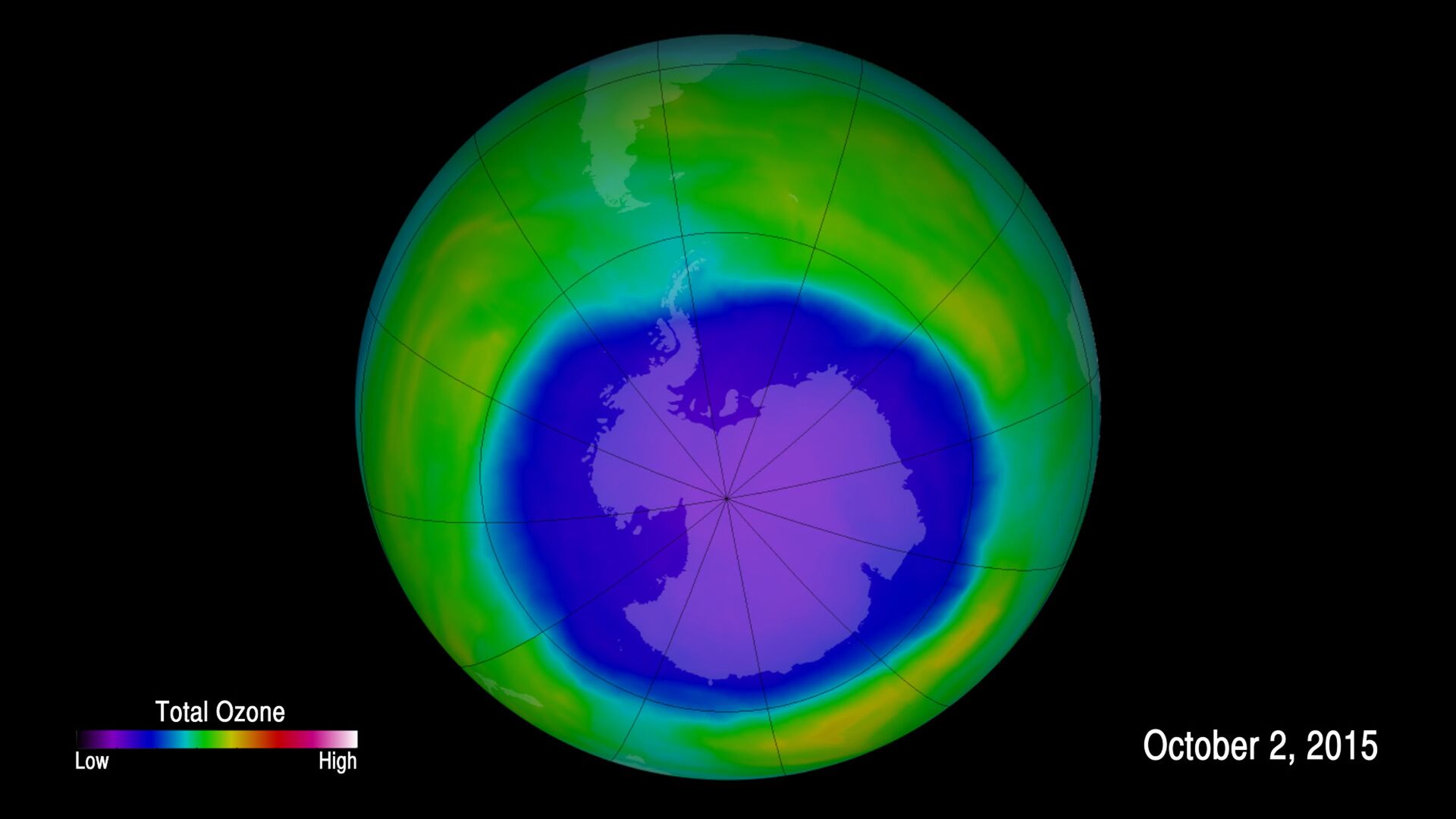https://sputnikglobe.com/20230110/un-report-reveals-ozone-is-healing-itself-should-be-normal-by-2066-1106184458.html
UN Report Reveals Ozone is Healing Itself, Should Be ‘Normal’ by 2066
UN Report Reveals Ozone is Healing Itself, Should Be ‘Normal’ by 2066
Sputnik International
Bromine and chlorine are both blamed for ozone depletion, and were banned in 1987 as part of the Montreal Protocol agreement. The deal was signed by every... 10.01.2023, Sputnik International
2023-01-10T03:28+0000
2023-01-10T03:28+0000
2023-01-10T03:22+0000
science & tech
ozone layer
environment
climate change
antarctica
https://cdn1.img.sputnikglobe.com/img/107681/97/1076819727_0:0:3001:1688_1920x0_80_0_0_232c0dc7ef2227f98fe19c563b6e458e.jpg
The ozone is slowly recovering from decades' worth of bromine and chlorine use that depleted it to the point that there was a gaping hole over Antarctica, a Monday report released by the United Nations has revealed.The report is the result of a once-every-four-years scientific assessment that has monitored ozone depletion since 1989. It states that at its current pace of healing, the average thickness of the ozone will return to pre-1980 levels around 2040, and the ozone above the Arctic should return to normal in 2045. However, things will take a little longer in Antarctica, where a gaping hole has been in the ozone for years. Scientists say at the current pace it will take until 2066 for the ozone to completely heal itself.The study determined bromine levels are down 14.5% since its peak in 1999 and chlorine levels are down 11.5% since its 1993 peak.The recovery of the ozone has been hailed as one of the most significant environmental victories in human history. UN Environment Programme Director Inger Anserson told the AP earlier this year that the ozone’s recovery is preventing over 2 million cases of skin cancer annually.The chemicals banned by the Montreal Protocol agreement were commonly used in refrigerants and aerosols. The near elimination of the chemical elements by the vast majority of the world showcases how the nations of the world can collaborate on environmental issues when there is a will. The rare act of collaboration gives hope to environmental activists that humankind can tackle climate change before it is too late.The report also mentions that a newer generation of the chemicals were banned a few years ago because they contribute to climate change. According to the report, that ban should prevent additional warming of 0.5 to 0.9 degrees Fahrenheit.
antarctica
Sputnik International
feedback@sputniknews.com
+74956456601
MIA „Rosiya Segodnya“
2023
News
en_EN
Sputnik International
feedback@sputniknews.com
+74956456601
MIA „Rosiya Segodnya“
Sputnik International
feedback@sputniknews.com
+74956456601
MIA „Rosiya Segodnya“
science & tech, ozone layer, environment, climate change, antarctica
science & tech, ozone layer, environment, climate change, antarctica
UN Report Reveals Ozone is Healing Itself, Should Be ‘Normal’ by 2066
Bromine and chlorine are both blamed for ozone depletion, and were banned in 1987 as part of the Montreal Protocol agreement. The deal was signed by every nation in the UN, effectively becoming the first universally-ratified treaty in the history of the governing body.
The ozone is slowly recovering from decades' worth of bromine and chlorine use that depleted it to the point that there was a gaping hole over Antarctica, a Monday report released by the United Nations has revealed.
The report is the result of a once-every-four-years scientific assessment that has monitored ozone depletion since 1989. It states that at its current pace of healing, the average thickness of the ozone will return to pre-1980 levels around 2040, and the ozone above the Arctic should return to normal in 2045.
However, things will take a little longer in Antarctica, where a gaping hole has been in the ozone for years. Scientists say at the current pace it will take until 2066 for the ozone to completely heal itself.
The study determined bromine levels are down 14.5% since its peak in 1999 and chlorine levels are down 11.5% since its 1993 peak.
The recovery of the ozone has been hailed as one of the most significant environmental victories in human history. UN Environment Programme Director Inger Anserson told the AP earlier this year that the ozone’s recovery is preventing over 2 million cases of skin cancer annually.
The chemicals banned by the Montreal Protocol agreement were commonly used in refrigerants and aerosols. The near elimination of the chemical elements by the vast majority of the world showcases how the nations of the world can collaborate on environmental issues when there is a will. The rare act of collaboration gives hope to environmental activists that humankind can tackle climate change before it is too late.
“Ozone action sets a precedent for climate action. Our success in phasing out ozone-eating chemicals shows us what can and must be done – as a matter of urgency — to transition away from fossil fuels, reduce greenhouse gases and so limit temperature increase,” World Meteorological Organization Secretary-General Prof. Petteri Taalas said in a statement.
The report also mentions that a newer generation of the chemicals were banned a few years ago because they contribute to climate change. According to the report, that ban should prevent additional warming of 0.5 to 0.9 degrees Fahrenheit.



